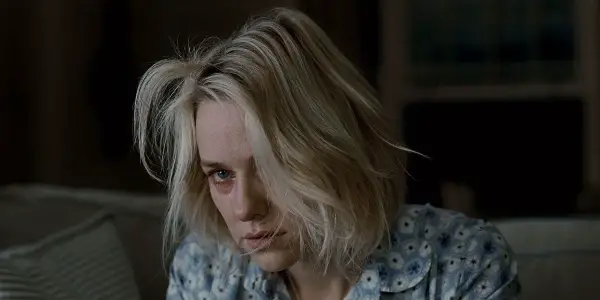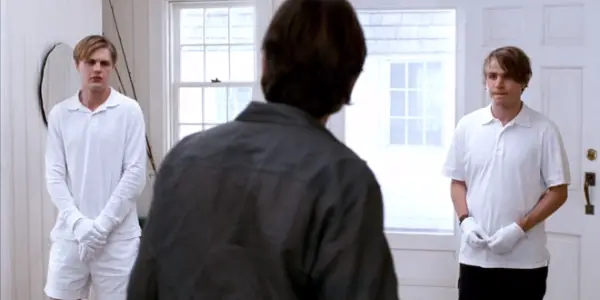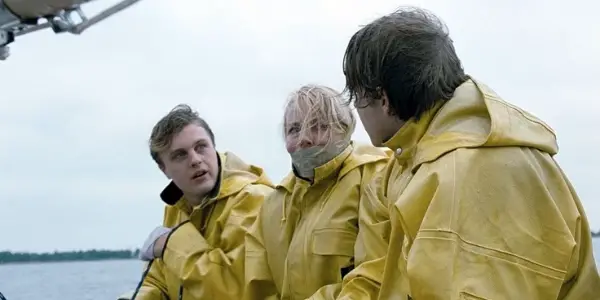Horrific Inquiry: FUNNY GAMES (2007)

Stephanie Archer is 39 year old film fanatic living in…
Welcome back to the scariest, and at times goriest, column here at Film Inquiry: Horrific Inquiry. Twice a month, I will be tackling all things horror, bringing two films back into the spotlight to terrify and frighten once more. And occasionally looking at those that could have pushed the envelope further. Join us as we dive deep into the heart of horror, but warning, there will be spoilers.
“Whether by knife or by gun, losing your life can sometimes be fun.” – Funny Games (2007)
It’s amazing the impact that one movie still can have. I was instantly drawn to the image of two men in yellow rain slickers, a woman bound between them, There was an eerie innocence in their faces contrasted by the presumed violence that was shared between them – the overcast skies only further driving the tainted youth before me. With the understanding the woman in the still was Naomi Watts, I had to know what terror she had once again found herself within.
Having tackled a horrific haunting in The Ring and found terror in her own child within Goodnight Mommy, the latest game Watts had stumbled onto was darker than I had seen her undertake before. A remake of his 1997 German horror of the same name, Michael Haneke‘s Funny Games finds little humor in the horror it unleashes on the unsuspecting Farber Family. A game to shock and horrify, this is not a film with a happy ending, but rather a terrifying understanding of the continuing cycle of violence.
The Game in the Slow Burn
Funny Games feels disconnected early on, a car traveling on screen, the dialogue of its inhabitants feeling removed and remised. It doesn’t fit, working more as voice over rather than dialogue belonging to any one character. As we are invited into the car to meet the Farber Family, so too are we introduced to the tranquility of their lives. On their way to their vacation home, they are calmly cocooned by the operatic music from the car’s radio, their camaraderie speaking to the close bond they share between them.

Yet this moment is sharply cut as a heavy metal score is introduced to the film’s opening credits, the family’s continued dialogue muted from the audience. There is an immediate sense of dominance crafted in these moments, as well as an initial foreshadowing of their fates. As the opening closes, this sense of foreshadowing deepens, the film’s antagonists are initially introduced in the distance, the family they are currently with commented on by the Farber family as strange. The film works as a slow burn from these moments, the family arriving at their home and settling in, the danger next door remaining on the periphery – for a time.
As Ann (Naomi Watts) prepares dinner and attempts to convince friends to come for the weekend, the young men begin closing in on the family. Their pure white outfits are as deceptive as their smiles. There is an uncomfortable innocence that they exude as they help launch the Farber’s boat and attempt to retrieve eggs for the neighbors. We as an audience know there is something wrong, but it is hard to put your finger on it – especially as the neighbors they are with appear to be well themselves, voguing for the two boys accompanying them. Is it the quick and slight look in their eyes? The “accidental” dropping of the phone in the sink water? The constant insistence that gives them a prolonged opportunity to stay? Culminating to an uncertain alarm on screen, we as an audience know something is off.

And this is the quietly devious nature of Funny Games. We have all watched a family physically and mentally tortured in a horror film before, but it is the film’s awareness that we know something is off that leads to our becoming unwilling witnesses – borderline participants – in the game playing out before us. As the film slowly burns to the revelation of the boys’ true nature, we can see it coming a mile away but can’t stop it. We cannot look away, the camera capturing the constant framework of contrast. The bright white soft lighting, white clothing and white gloves defy the violence as it slowly begins to unravel. The first violent moment is the disappearance of the family dog, his alarming barks and jumping at the boys leading to his being the first member of the Farber family to be silenced. We as an audience know that Paul (Michael Pitt) has gone out to try the golf driver, the dog’s barking increases before becoming distressed and quiet.
Breaking the Fourth Wall
The golf club may not have any blood on it, but we know what has happened to the family dog. We are already disgusted before George (Tim Roth) is bludgeoned in the knee cap by the same club, Ann left to make the realization and horrific discovery of the dog’s body. While the imagery of the dog spilling out the family car after a game of “hot” and “cold” remains one of the film’s more shocking moments, it is Paul’s unexpected reaction – he turns to look at the camera. Starring deep into our eyes, there is a feeling he knows we are there – he knows we are watching. He is creating our entertainment. This is further driven later on when Ann asks Peter (Brady Corbet) why they won’t just kill them, his response “You shouldn’t forget the importance of entertainment”.

In this manner, this dark film flirts with its audience, taunting our participation while continuing on its path of torture and destruction. As the sun begins to set, the true realty begins to set in as well. This is not the first time Peter and Paul have enacted one of their games, our thoughts constantly drawing back to our vague and brief memories of the neighbors next door – and their potential future victims Paul was already been introduced to earlier on. We feel this circle of violence before it has even finished its rotation, the film working to verify our assumptions all while creating a game of mental and physical torture that has only one end game.
With a bet in place that the Farber family will be dead by 9am the next morning, the film introduces its second and most direct breaking of the 4th wall. While the Farbers refuse to accept the bet, Paul reveals there is no option, “there has to be a bet”. He turns to the camera, asking the audience for our opinion. Without pausing for a moment, Paul deduces we are most likely on their side, once again challenging us to place our bets like one would at the races. “Who are you betting on hmm?”. Where we felt like unwilling participants to the dog’s destruction and discovery, here we are invited to be apart of the violence, to place bets on the lives of the chosen before us. Yet as much as it is an invitation, it is also as much unwilling participation. While we are asked to place our bets, our side is practically chosen for us, forcing our investment into the fates of these individuals, though met with the confidence of Paul that we are choosing the underdogs. Paul wants us to be a part of the film, to find a deeper visceral feeling within the stakes that lay ahead for the Farbers. And in this moment, he has assured that we will, for better or worse, be entertained.
Shocking to the End
The film continues on a presumed path of torture and violence from here, each moment of possible escape met with an even more violent return. Yet as presumed as the violence is, the film finds its moments to remain unpredictable. Now, if you have seen the original, this shot-for-shot remake may lack the surprises you might be looking for. But for those who are not familiar with the German language horror, Funny Games will leave you shocked. While off-screen, the film toys with the death of the Farbers’ son Georgie (Devon Gearhart), our trained eyes waiting for the moment the poor boy meets his fate – all the while hoping he escapes. And for a moment, he does. He shows his savvy, keeping his wits about him, and removing anything that could give him away as he is stalked while hiding in the neighbor’s house. But Funny Games finds the irony in the moment, the boy unable to escape his fate – unable to escape the violence closing in on him. These moments speak to the overarching message of the film, the cycle of violence inescapable as a growing desensitized audience desires more. Caught by Paul and brought back to the house, the clock continues to tick down to 9AM and the first of the Farber family succumbs to their fate, the boy shot off-screen, with only the screams of Watts‘ Ann to confirm the victim before the audience sees the aftermath.
In this moment, Paul could have killed the boy at the neighbors’ house, keeping the violence off screen, returning without the boy. Yet, Funny Games plays its audience and its unyielding sense of hope. We hope the boy will escape, we hope he will allude Paul – we hope that he has the strength to survive. Yet, we are left with the shock and horror that violence knows no age, will to live or strength of self. Yet as shocking as the boy’s death is, the film’s entirety of death remains just as shocking. The death of Watts‘ Ann feels a bit anticlimactic, though ends the film on an ominous tone. Peter and Paul, their names and white outfits almost speaking to that of fallen angels, live up to their bet, the entire Farber family meeting their end before 9am the next morning. Donning yellow rains slickers, their outfits quietly representing each of the boys as smooth talkers but untrustworthy as they bring Ann out to the middle of the lake, their boredom with the game and desire for a new one bringing a quick end to Ann’s life as she is pushed overboard, bound and gaged with no hope for escape.

Horror films have trained us to expect the final girl, to hold on to hope to the film’s final moments. But Funny Games does not acknowledge this hope and desire for survival. It sees the entertainment until it is no longer entertaining, pushing the current path aside and moving onto the next game. It bets on our investment, welcoming us to root for the family before us, only to prove that the only power we ever had was our continued participation and anticipation for more. While the death of Ann is both shocking and anti-climatic in the face of the film’s previous violence, she is just a moment within a bigger picture.
Conclusion
One of the most shocking moments in the film, however, is the film’s refusal to let Ann or the Farber family win. Having escaped and attempted to seek help, Ann is spotted by the boys and forcibly brought back to the house. While the boys select who is next to die, Ann can grab the shotgun, firing point blank into Peter’s chest. Paul is enraged, urgently looking for the remote and rewinding the moment to just before Ann grabs the gun. As the scene replays itself, this time Paul prevents Ann from grabbing the gun. It speaks to Paul’s control of the situation, crafting his events as he sees fit and proving there is no stopping the intended outcome. Furthermore, the film utilizes this moment to speak to its overarching message of the cycle of violence and its inertia. It is shocking and out of place, yet a powerful moment in the film before playing out the rest of its game for the audience.
As Ann is pushed over the boat, the boys make their way to the next house once again asking for eggs for the neighbors. As the woman inside goes to retrieve the eggs, Paul once more breaks the fourth wall, looking at the camera and smirking, giving one last acknowledgment to the success of his games and entertainment both past and present, as well as our continued presence.
Does content like this matter to you?
Become a Member and support film journalism. Unlock access to all of Film Inquiry`s great articles. Join a community of like-minded readers who are passionate about cinema - get access to our private members Network, give back to independent filmmakers, and more.













